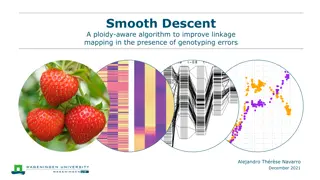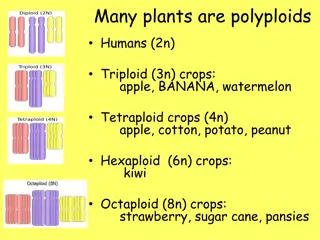Understanding Ploidy and Chromosome Numbers in Organisms
Ploidy refers to the number of complete sets of chromosomes in a cell, impacting the number of possible alleles. Humans are diploid, with 2 sets of 23 chromosomes each from parents, totaling 46 chromosomes. The haploid number for humans is 23, and the monoploid number is also 23. Variations in ploid
0 views • 8 slides
Smooth Descent: A Ploidy-Aware Algorithm for Improved Linkage Mapping
Introducing Smooth Descent, an algorithm designed to enhance linkage mapping accuracy in the presence of genotyping errors. This algorithm iteratively eliminates errors to refine map order, accommodating various marker types and ploidies. By predicting and detecting errors in Identity by Descent (IB
0 views • 12 slides
Understanding Polyploidy in Plants: Implications and Techniques
Polyploidy is common in plants, with various crops like apple, banana, and watermelon displaying different levels of ploidy. This phenomenon influences characteristics and breeding strategies. Techniques like crushing bananas to separate cells, using hypotonic water to swell cells, adding salt to ai
0 views • 4 slides


